‘John and the Hole’ Review: Trapping Your Childhood
This is a custom heading element.
It would be understandable to ask, much as I did while being led down the absurd path that John and the Hole leads its audience, where is the bottom of this movie? To what depths will this playfully sadistic film go?
In broad terms, John and the Hole is a film about a child who rebels against his family. The more specific, spoiler-filled description is that it’s a film about a young boy who–for reasons that are at first unknown–drugs and drops his father, mother, and sister into a bunker on the family’s property, leaving them trapped while he is left to preside above.
It’s an absurd premise that rests upon a dark inclination, and it would be understandable to assume that the film would take an utterly depraved descent into the horrific from there. But audiences should feel comfortable in knowing that in director Pascual Sisto’s world, trapping one’s family is just a necessary formality so that a child can explore what it means to be an adult, and beyond that, freedom.
John and the Hole is a black comedy that feels like if Yorgos Lanthimos directed a version of Home Alone, or if Lynne Ramsay’s wicked We Need To Talk About Kevin wanted to let a little air out of itself. Sisto’s filmmaking–cold and clinical, yet clean and pristine (and opts to shoot 4:3 aspect ratio, whose black letterboxing traps the whole story in a proverbial hole)–feels more like an exercise to capture tone and mood, but its pitch-black tone cradles its odd fable, which explores the nature of childhood and the resigned feeling of being helpless and dependent on adults, and needing them and not understanding why.

These are the thoughts that occupy our titular character, John (Charlie Shotwell, Captain Fantastic), an intellectually gifted yet odd kid. He’s proficient at tennis and piano and knows the square root of 225 (even though he “doesn’t know” how he knows). But he’s trapped in his head, unable to communicate a confusion that comes from not understanding the outside, grown-up world. His family extends their love and non-threatening warmness to his sweet, silent self. That’s why it’s a total left-turn when his family wakes up one morning to find themselves trapped at the bottom of a bunker with no way out.
Sisto plays with denying the audience the reason why John’s trapped his family at the bottom of a hole, but we soon find that it’s more innocent than it is sadistic; he’s not getting pleasure in torturing them. He checks in on his family (Michael C. Hall, Jennifer Ehle, and Taissa Farmiga) occasionally, it’s just that he wants to do fun kid things, like play with his drone, eat fast food, and play video games with his friend (who he picks up joyriding the family car).
With such a wild concept, John and the Hole could so easily fall apart into the ridiculous at any moment. But Sisto provides an airtight framework that feels in control of its absurd logic and vision every step of the way while remaining playful and sidestepping expectations to be a mostly innocent exploration. And, without giving anything further away, there’s a narrative framing device that’s revealed past the film’s initial introduction that establishes another layer to the film and shows that maybe he’s trapping his family out of misplaced fear so that they can never leave him.
Selected to play at Cannes Film Festival, John and the Hole is a confident, visionary, and daring exercise in tonal filmmaking, as well as a provocative exploration of childhood and adulthood. Sisto leaves much of the film open to interpretation, so the audience can make a lot of its own meaning. In that sense, there’s much to consider while going farther and farther down into the void.
This review originally ran as part of our 2021 Sundance Film Festival coverage.
Ryan Rojas
Ryan is the editorial manager of Cinemacy, which he co-runs with his older sister, Morgan. Ryan is a member of the Hollywood Critics Association. Ryan's favorite films include 2001: A Space Odyssey, The Social Network, and The Master.

